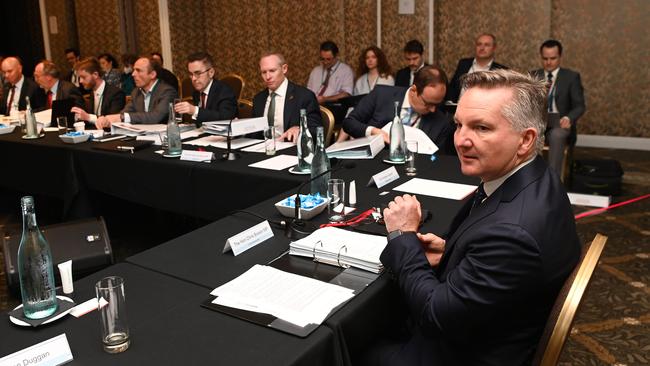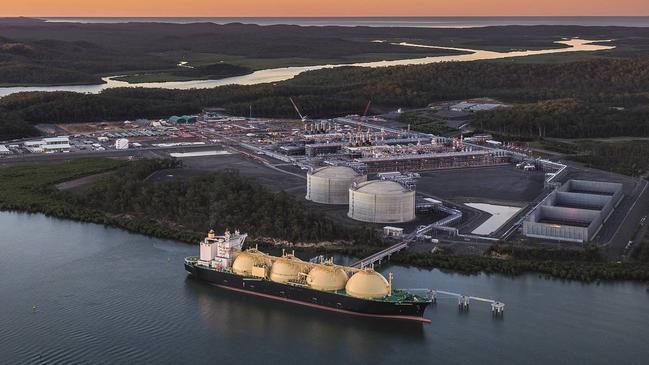
The transfer of funds directly away from investors is the real world effect of a policy designed to prevent “wartime profiteering” playing out. The wartime quip came from federal Industry Minister Ed Husic, showing the level of discussion around the table when it comes to shaping economically significant policies.
Australia is not at war and nearly every country that is reliant on coal or gas to power their grids is in the same boat when it comes to soaring prices. But unlike Australia, many seem to be seeking a supply solution first.
The Albanese government’s decision to up-end a functioning market with price caps as well as longer term pricing restrictions will have serious implications, particularly when it comes to securing enough gas supply to power industries in years to come.
Consortiums looking to build an LNG import terminal, which is the only realistic solution to quickly getting more gas into eastern Australia in the near future, have suddenly seen their financial returns diminished. This raises doubt over whether these projects will now get off the ground.
Origin Energy’s investors could be the biggest losers in the near term, with doubts growing over the power generator’s friendly $18.4bn takeover by Brookfield and EIG. The bid remains under due diligence, but looming regulatory intervention could put a different value on Origin’s LNG export operations, which are set to go to EIG. This LNG business directs uncontracted gas back into the local market, which suddenly has less value. Falling electricity prices from the 12-month price caps are a net negative for Origin and rival generator AGL, which both have pledged to spend billions of dollars in a green transition. Origin shares ended down 7.9 per cent, while AGL was off 2.6 per cent, as wholesale electricity futures started to drop.

The knock-on impact is broad. Queensland coal hauler Aurizon was off 4.7 per cent. Gas producers Beach (-2.4 per cent) and Cooper Energy (-7.7 per cent) and coal exporter Whitehaven (-2 per cent) were all caught in the policy net.
Energy majors are now preparing a push-back on a compulsory code of conduct Albanese and Energy Minister Chris Bowen have sought to ram through along with the price caps.
Here Canberra plans to replace the gas price cap with a “reasonable pricing” provision which is set to kill off any LNG import project in southeast Australia. LNG exporters can secure better pricing on international markets rather than face selling at a loss to Australian users.
In a consultation paper, Treasury says such a rule is needed to address “systemic issues” within the wholesale gas market and guide participants’ behaviour”.
“A reasonable pricing framework will provide a basis for producers and buyers to negotiate domestic wholesale gas contracts at reasonable prices,” it says. Pricing should reflect the cost of domestic gas production including a reasonable return, the Treasury paper says, but doesn’t define reasonable.
It is worth considering it was the competition regulator, the ACCC, that advised the government that the $12 per gigajoule gas price cap proposed for the next 12 months should be “reasonable”, based on an analysis of hundreds of gas market offers made in 2021. However, that was a year before the EU slapped Russia with heavy sanctions over the Ukraine war, sending many countries scrambling for alternative gas supplies.
As MST Marquee analyst Mark Samter says: “They have basically nationalised the gas market, but expect private entities to keep putting their capital into it.”
On energy regulator AEMO’s figures there is a forecast of a 36 per cent gas supply shortfall in the southeast in 2025. To ram this home, Woodside and ExxonMobil are literally in the process of filling out the paperwork to remove a dozen oil and gas platforms in maturing Bass Strait fields.
Cooper Energy says the caps and pricing measures “undermine the incentive to explore and develop incremental gas at the very time it is most needed”.
The code of conduct needs to be explicit in its support for “market pricing” not only to remove any uncertainty but actively encourage gas exploration and development, Cooper argues.
A short-term energy policy that stands to penalise the companies looking to spend big on the green transition overshadowed the release by Treasurer Jim Chalmers of a more significant document for the green energy shift, with planned rules for mandatory climate reporting standards.
The proposals have been a long time coming and will provide a framework for businesses to measure and compare carbon emissions in a consistent way as well as disclosing climate-related risks. The changes are seen as an important step in attracting investment capital, particularly in renewables where it is desperately needed. But all this risks being undermined by the sugar hit of energy market intervention.
–
Tyro takes a hit
Westpac has shown its new-found discipline by opting to walk rather than to be drawn into a bidding war for payments player Tyro.
It’s a big moment for the David Thodey-chaired Tyro, which has also knocked back a sweetened $829m offer led by private equity play Potentia Capital – against the wishes of his biggest shareholder, the billionaire Mike Cannon-Brookes.
Potentia, which is backed by former Archer Capital executive Andrew Gray and ex-MYOB boss Tim Reed, over the weekend upped its own offer, even with Westpac kicking the tyres on Tyro over the past eight weeks.

But Tyro’s board said talks with Westpac and Potentia had not resulted in an offer that “fairly values” the payments tech company.
Cannon-Brookes, who has a 12.5 per cent stake, had backed the Potentia offer with an agreement to sell and at the same time established a new floor of $1.85 a share for a competing bid. That’s the number Westpac would have had to deliver in order to get Cannon-Brookes to switch sides, and it’s getting back to bubble territory.
Potentia, which also includes Cbus and Aware Super, on Sunday upped its own bid from $1.27 to $1.60 a share on the condition of due diligence. Westpac didn’t get to the point of submitting an offer, while Potentia has an offer ready to go.
With two bids evaporating on Monday, Tyro’s shares unsurprisingly took a hit, diving nearly 20 per cent to $1.23. It’s a bad day for Cannon-Brooks, whose 11 per cent-plus stake in energy company AGL has also come under pressure from the Albanese government’s proposed price caps.
Now, Tyro’s board will need to convince shareholders it can deliver better value going it alone.
It has already built unrealistic expectations around this by suggesting tech company shares can again hit the highs seen in the midst of the technology boom, when rock bottom interest rates were inflating all tech companies.







Labor’s radical coal and gas price caps wiped more than $1.6bn off electricity and gas producers on day one, ironically exceeding the amount Canberra has pledged to spend on electricity subsidies for low-income households and small businesses.